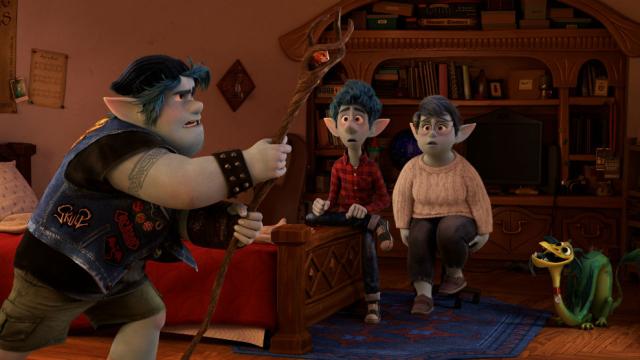With houses that fly, rats that cook, and toys that talk, Pixar’s films always have incredibly imaginative stories. They’re also well known for being emotional, exploring love and loss in ways that are almost guaranteed to make audiences weep. On those two counts, Pixar’s latest film Onward lives up to its predecessors.
Onward is (loosely) based on the events of director Dan Scanlon’s real life, blending a fantastical world with grounded, emotional storytelling that runs the gamut from joy to grief. But its emotional climaxes and grand worldbuilding come at points few and far between, leading to a film that is only occasionally truly magical. In large part, it’s a relatively straightforward movie—one that, while serviceable, feels like it never truly explores the full potential of its world, nor one that lives up to the often weighty expectations we place on a film from Pixar.
Onward is set in a fantasy world filled with elves, minotaurs, dragons, and magic. However, magic itself hasn’t existed for a long time. Over several generations, the ease and speed of technology have all but sucked it out of the world, leaving mystical beings who just happen to live a lot like humans do today. In that space, we meet Ian (Tom Holland) and Barley (Chris Pratt), two radically different teenage brothers. Barley is fearless, outgoing, and incredibly nerdy. Ian is shy, reserved, and still not quite sure about himself. The main thing the brothers have in common, besides their mum Laurel (Julia Louis-Dreyfus), is that they miss their dad, who passed away before Ian was able to meet him.
Then, on Ian’s 16th birthday, Laurel gives him a gift. It’s his dad’s wizard staff complete with a spell that will bring him back for 24 hours. Unfortunately, since magic isn’t practiced regularly anymore, Ian messes up the spell. He and Barley must venture out to get a gem that’ll let them fix the spell so they can see their dad before the 24 hours run out.
It’s a seemingly complex plot with equally dynamic characters, who are all well-defined by their super famous counterparts. And as all of the world-building and characterization is happening, Onward fires on all cylinders. It sucks you in, beautifully blending the wonder of the paternal resurrection with a contentious sibling rivalry. Once Ian and Barley hit the road though, Onward starts to fade.
What began as a strong, original vision pivots to a rather familiar road trip adventure. Obstacles and goals are set and dealt with in steady succession and with increasing difficulty, and that constantly forward momentum ends up undercutting much of the emotional connection. The story overpowers its context. Even with a 24-hour ticking clock of their task, the propulsive second act lacks any real stakes or drama because it’s too concerned with moving on to the next thing. Meanwhile, the audience kind of knows where this is all headed and the journey to get there feels like the filmmakers simply came up with a series of funny gags to keep us occupied as a means to that end.
That end, though? It’s worth the price of admission alone. As you can imagine from the premise, Ian and Barley are eventually faced with potentially meeting their long-deceased father while simultaneously facing a hugely epic and cool third act foe that’s been seeded throughout the film. Once it all comes together, you’ll be hard-pressed not to shed a tear at what has happened. Plus, that impactful ending boosts the rest of the film, making it feel greater than the actual sum of its parts.
That’s the odd thing about Onward, though. While its emotion and structure are certainly uneven, there’s not anything truly bad to say about it. Those nonstop gags in the middle are often quite charming, as is the voice cast, which also includes Octavia Spencer as a mythic creature called the Manticore. There are plenty of great scenes with Ian learning magic, some very strong character moments between the brothers, consistently clever uses of the fantasy world, and even a melancholy subtext about the dangers of technology.
The prevailing issue is that while Onward does everything well, it only does a few things exceptionally well, which is a standard we’ve come to expect from Pixar’s storytelling. Though it’s set in this grand, Pixar-level, out-of-the-box setting, most of the movie isn’t that. Once the plot gets moving, it’s a fairly steady progression toward its conclusion. There are no real big surprises or things that stand out until the climax. The whole thing is sort of like watching waves on a beach. It’s beautiful, there’s a build-up, an expected payoff, and it just happens again and again.
I guess the real argument with Onward comes down to a single question: Can a great ending save an otherwise average movie? The answer probably comes down to personal preference. Did you connect with the character’s journeys by the end? For me, that answer is “Yes,” and that’s why I think ultimately, Onward works. I’ll absolutely watch it again. It’s got heart, it’s got laughs, it’s filled with inconsequential little touches you are sure to miss on first viewing. Yes, it’s a little bit familiar, but familiar works more often than not. And such is the case with Onward. A great ending and decent setup come together to make solid, albeit slightly underwhelming Pixar, movie.
Onward opens April 2.
